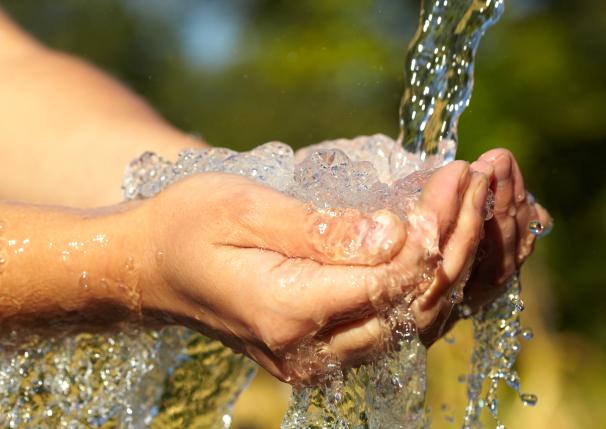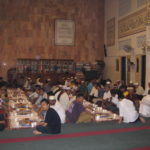Cleanliness is an important part of daily life to a Muslim. In fact, it is a precondition to the fundamentals of worship. One must perform the ritual of wudu and/or be in a state of wudu before salah (prayer). Wudu is a state of purification; purifying oneself from sin. If one is not in the state of wudu, your prayers will be invalid and won’t be accepted according to the Prophet Muhammad (pbuh) narrated in several hadiths.
“O you who have believed, when you rise to [perform] prayer, wash your faces and your forearms to the elbows and wipe over your heads and wash your feet to the ankles. And if you are in a state of janabah, then purify yourselves. But if you are ill or on a journey or one of you comes from the place of relieving himself or you have contacted women and do not find water, then seek clean earth and wipe over your faces and hands with it. Allah does not intend to make difficulty for you, but He intends to purify you and complete His favor upon you that you may be grateful.” [Surat al-Ma’idah 5:6]
Steps of Wudu
“He washed his hands thrice. He then rinsed his mouth and cleaned his nose with water (three times). He then washed his face three times, then washed his right arm up to the elbow three times, then washed his left arm like that, then wiped his head; then washed his right foot up to the ankle three times, then washed his left foot like that…” [Sahih Muslim 226a]
It was narrated that ‘Amr bin ‘Abasah said:
“The Messenger of Allah said: ‘When a person performs ablution and washes his hands, his sins exit through his hands. When he washes his face, his sins exit through his face. When he washes his forearms and wipes his head, his sins exit though his forearms and head. When he washes his feet, his sins exit through his feet.'” [Sunan Ibn Majah Vol. 1, Book 1, Hadith 283 (Hasan)]
Step 1: Niyyah
(Intention) First start by making the intention to clean and purify yourself for prayer. This is an intention that comes from the heart and does not need to be verbalized or said aloud. As the Prophet Muhammad said, “The reward of deeds depends upon the intentions and every person will get the reward according to what he has intended….” [Sahih al-Bukhari 1
Step 2: At-Tasmiyyah
(Mention the name of Allah) The Messenger of Allah (pbuh) said: The prayer of a person who does not perform ablution is not valid, and the ablution of a person who does not mention the name of Allah (in the beginning) is not valid. [Sahih Sunan Abi Dawud 101] Therefore, you should always begin your wudu in the name of Allah by saying, “Bismillah”. Here is a dua that can be said:
“I begin my ablution in the Name of Allah. All praise is due to Allah, who made water purifying, and not najis.”
(Bismillahi wa billahi wal hamdu lil lahil lazi ja’alal ma’a tahura wa lam yaj alhu najisa.)
Step 3: Wash Hands
Start with your right hand. Use your left hand to wash your hand with water three times, washing between the fingers and all the way to the wrist. Repeat using your right hand to wash your left hand. Below is a suggested dua that can be recited while washing hands:
“O Lord! Make me of those who repent and purify themselves.”
(Alla hummaj alni minat tawwabina waj alni minal mutatah hirin.)
Step 4: Cleanse Mouth
Using the right hand, scoop water into the mouth and swish around. Be sure to rinse every area from the pockets of the gum line to the back of the mouth. Then spit out the water. Repeat this three times. Here is a dua you could recite as you start or complete this step in wudu:
“O Lord! Dictate to me the principles of faith on the Day I meet You, and make my tongue fluent with Your remembrance.”
(Alla Humma laq qini hujjati yawma alqaka wa atliq lisani bizikrika.)
Step 5: Cleanse Nose
Scoop water with your right hand and snuff the water into your nostrils. With the fingers of the left hand, blow out the water from your nose. Repeat this three times. Below is a dua to recite while cleansing the nose.
“O Lord! Do not deprive me of the fragrance of Paradise, and make me of those who smell its fragrance and perfume.”
(Alla humma la tuharrim ‘alaya rihal jannati waj ‘alni mim man yashummu riha ha wa rawha ha wa tiba ha.)
Step 6: Wash Face
Now wash your face three times. This means your whole face, not just part of it. According to the fiqh of wudu and in the book of Sifat wudu’-n-Nabee, “The face is determined as being everything between the beginnings of the hair down to the cheeks and the chin, and up to the start of the ears including that which is between the beard and ear.” Here is a dua to recite:
“O Lord! Make my face bright on the Day when the faces will turn dark. Do not darken my face on the Day when the face s are bright.”
(Alla humma bayyiz wajhi yawma taswaddufihil wujuh wala tusawwid waj hi yawma tabyazzul wujuh.)
For the brothers who have beards, this is also the time that you wash your beard. “Whenever the Messenger of Allah (pbuh) performed ablution, he took a handful of water, and, putting it under his chin, made it go through his beard, saying: Thus did my Lord commands me.” [Sahih Sunan Abi Dawud 145] Therefore, scoop water into your right hand and enter below the chin. Make sure you get water to the roots and run your fingers through.
Step 7: Wash Arms
First, using your left hand, wash your right hand, including between your fingers, and your arm all the way to the elbow. Repeat this three times. You could then recite a dua such as this one:
“O Lord! Give my book of deeds in my right hand, and a permanent stay in Paradise on my left, and make my reckoning
an easy one.”
(Alla humma a’tini kitabi bi yamini wal khulda fil jinani bi yasari wa hasibni hisaban yasira.)
Next, using your right hand, wash your left hand, including between your fingers, and your arm all the way to the elbow. Repeat this three times. You could then recite a dua such as this one:
“O Lord! Do not give my book of deeds in my left hand, nor from behind my back, nor chain it to my neck. I seek refuge in You from the Hell-fire.”
(Alla humma la tutini kitabi bishimali wala min wara’i zahri wala taj alha maghlu. Latan ila unuqi wa a’uzu bika min muqat ta’atin niran.)
Step 8: Wiping the Head
Take both of your wet hands and starting from the forehead, run your fingers through your hair all the way to the nape of the neck and then back to the forehead again. Make sure your fingers or hands touch the scalp. Do this action once.The Prophet (pbuh) wiped his head with his two hands, moving them forwards and backwards – beginning with the front of the head and (wiping) with them up to his nape then he (pbuh) returned them to the place from which he began. [Sahih Jami’ at-Tirmithee] Below is a dua that could be said:
“O Lord! Cover me with Your Mercy, Blessings and Forgiveness.”
(Alla humma ghashshini bi rahmatika wa barakatika wa ‘afwika.)
Step 9: Wiping the Ears
Insert the tips of the index fingers into the ears. Then follow along the folds of the ears with the index fingers while passing the thumb behind the ears from the bottom to the top. This can easily be done with a fluid movement with the water used to wipe the scalp. Do this once.
Step 10: Wash the Feet
Using the right hand, wash the right foot up to the ankles. Use the right pinkie finger to wash between the toes. Do this three times. Next, use the left hand, wash the left foot up to the ankles. Use the left pinkie finger to wash between the toes. Do this three times. The Prophet Muhammad (pbuh) was seen rubbing his toes with his little finger when he performed ablution according to Sunan Abi Dawud 148 (Sahih). Below is a dua that could be used during or after this action:
“O Lord! Keep me firm on the Bridge (to Paradise) on the Day when the feet will slip, and help me in my efforts to do things which will please You, O’ Glorious and Mighty!”
(Alla humma thabbitni alas sirati yawma tazillu fihil aqdam. Waj’al sa’yi fi ma yurzika ‘anni ya zal jalali wal ikram.)
Step 12: Recitation
It is said in Riyad as-Salihin Hadith 1032, that the Prophet Muhammad said that whoever recites the following supplication after wudu then the eight gates of Jannah are opened for him and he may enter through whichever of these gates he desires.
“I testify that there so no true god except Allah Alone, Who has no partners and that Muhammad (pbuh) is His slave and Messenger.”
(Ash-hadu an la ilaha illallahu Wahdahu la sharika Lahu, wa ash-hadu anna Muhammadan ‘abduhu wa Rasuluhu.)
“O Allah make me among those who repent and purify themselves.”
(Allahummaj-‘alni minat-tawwabina, waj-‘alni minal-mutatahhirin.)
Please note:
For men who wear a headpiece that is difficult to remove, the Prophet Muhammad (pbuh) would wiped over his socks and over his forehead and over his turban. [Sahih Muslim 274i] For women who are in public, therefore cannot remove their head covering, the same basic rule applies. Wipe over the headscarf. Some try to gently wipe a few strands under their headscarf if possible. Also if you were in a state of wudu when you put on your socks, then it is permissible to just wipe over the socks when performing wudu for prayer.
Reciting duas during wudu is not mandatory. The only two things that must be said to complete your state of wudu is in Step 2 and Step 12. However, many Muslims recite duas during wudu. It can be one way of staying focused on your intentions of wudu and being purified before standing before Allah in prayer or reading the Qur’an.
Things That Nullify Wudu:
- Not having the intention to wudu
- Not saying “Bismillah” before performing wudu
- Vomiting
- Urination
- Passing feces
- Passing gas
- Bleeding/Menstruation/Bleeding after giving birth (which will require ghusl)
- Sexual relations, such as having intercourse (which will require ghusl)
- Sexual discharge, such as prostatic fluid in men and sexual vaginal discharge in women (which will require ghusl)
- Touching genitals with bare hand
- Sleep
- Loss of consciousness
- Intoxication
For further reading, see what Sharia (Islamic Law) says regarding wudu.
Watch a video on how to perform wudu. Dr. Bilal Philips, founder and dean of Islamic Online University, also has a video of a khutba (Islamic lecture) on the importance of wudu.






